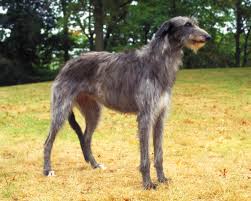
Scottish Deerhound
Conditions of detention
Scottish Deerhounds thrive in rural environments with plenty of space to run and exercise. They are not well-suited for apartment living due to their size and exercise needs.
Useful Fact: A large, secure yard is ideal for a Deerhound, allowing them to run and play freely, which is essential for their physical and mental well-being.
Nutrition and diet
A balanced diet rich in high-quality proteins, fats, and essential nutrients is crucial for the Scottish Deerhound. Their diet should support their active lifestyle and large size.
Useful Fact: It’s important to feed Deerhounds multiple smaller meals throughout the day rather than one large meal to prevent bloat, a common issue in large, deep-chested breeds.
Health
Scottish Deerhounds are generally healthy dogs with a lifespan of 8-11 years. However, they can be prone to specific conditions such as cardiomyopathy, bloat, and osteosarcoma.
Useful Fact: Regular veterinary check-ups and being aware of the signs of common health issues can help manage and prevent potential problems.
Grooming and care
Scottish Deerhounds have a harsh, wiry coat that requires regular grooming to prevent matting and remove dead hair. Weekly brushing is recommended.
Useful Fact: Occasional hand-stripping of the coat can help maintain its texture and appearance.
Education and training
Scottish Deerhounds are intelligent and gentle but can be somewhat independent and stubborn. Positive reinforcement and patience are key in training.
Useful Fact: Early socialization and basic obedience training are crucial to ensure a well-mannered adult dog.
Toys and entertainment
Interactive toys, puzzle games, and activities that stimulate both their mind and body are ideal for keeping a Scottish Deerhound entertained.
Useful Fact: Deerhounds enjoy activities that allow them to use their natural running abilities, such as lure coursing.
Safety
Ensure your home and yard are secure, as Deerhounds have a strong prey drive and may chase after small animals.
Useful Fact: Because of their size, it’s important to teach Deerhounds proper leash manners to prevent them from pulling or lunging during walks.
Accessories
Sturdy collars, harnesses, and leashes are necessary for daily walks. Grooming tools like brushes and combs are also essential.
Useful Fact: Due to their size and strength, using a harness rather than a collar for walks can provide better control and comfort.
Socialization
Early and regular socialization with other dogs, animals, and people is crucial for a well-rounded Scottish Deerhound. This helps in developing a friendly and confident demeanor.
Useful Fact: Puppy classes and regular playdates with other dogs can enhance their social skills and reduce shyness or aggression.
Travel and Transportation
Scottish Deerhounds adapt well to travel, but ensuring they are comfortable and secure in a car or crate is important for safety.
Useful Fact: Due to their size, it’s important to have a spacious vehicle or travel crate to accommodate a Deerhound comfortably during trips.
Behavior and psychology
Scottish Deerhounds are gentle, friendly, and dignified. They are known for their loyalty and affectionate nature with their families.
Useful Fact: Despite their size, Deerhounds are known for their calm demeanor indoors and enjoy lounging with their family.
Legal aspects
Owning a Scottish Deerhound may require specific licenses or adherence to local regulations regarding pet ownership. Ensure your dog is registered and vaccinated according to local laws.
Useful Fact: Familiarize yourself with breed-specific legislation in your area to avoid any legal complications.


